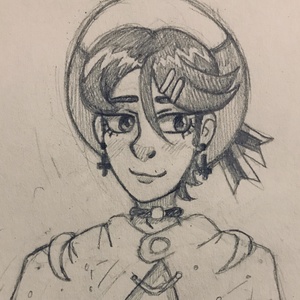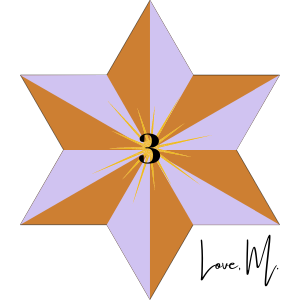“Is my child born yet?” The Amari King asks for the umpteenth time, like a broken clock that still cuckoos even after being slammed multiple times. The man notorious for his iron first and towering stature is pacing nervously in the Royal Hospital's delivery room waiting room, his hands trembling and beads of sweat forming on his brow and nape. His lips would quiver now and then, and he'd let out a shaky sigh.
“Not yet, Vhar El Haluman,” answers his aide, Arman. [1]
A lady in a bold-colored gown snaps her fan close and rolls her eyes. “You must calm down, My King. Labor is hard and tiring for everyone.” Her high-pitched voice is full of lasciviousness. She tries to divert her husband’s attention as she straightens her posture and subtly pushes her bosoms forward.
“I agree with Royal Consort Alicia, My King,” another woman says. “Hearing you pace back and forth and ask if the Princess is born yet, the midwives might think that you are getting impatient and try to speed up the process.”
“What Royal Consort Alicia and Concubine Avria said were correct, Vhar El Haluman,” Arman seconded. “It may harm both the mother and child.”
Upon hearing this, the King tried to calm himself, for he didn’t want anything wrong to happen to either his wife or his child. Although he no longer walked back and forth and is now standing in place, his stance is not that of a king nor of a proud man. He puts his weight in one of his feet, tapping his thighs continuously with his fingers. No one bothered to tell him how much of a joke he looks right now in fear of angering him and complicating the already complicated birthing.
The three heavily dressed women almost simultaneously roll their eyes. The King already has seven sons, two of which are a pair of twins. He has been in the waiting side of the delivery room six times, and he has never acted the way he is now, which irritated Royal Consort Alicia as she is one of the people who gave birth to his children. This makes her detest the soon-to-be mother and child pair more and more as time passes by.
The King starts to pace back and forth once again, biting his fingernails in the process as he attempts to stop himself from asking if his wife has given birth already. He doesn’t know what he’s feeling right now; he is both excited and frightened at the same time. His whole life, he prayed for this day to finally come, for a woman to be born in the Amari nobility. But now that his prayers are being answered at that very moment, he has become agitated and anxious. It feels like a dream that would soon turn into a nightmare that he won’t wake up from. He could feel butterflies in his stomach, but he could also feel his insides churn. Even though he had gone through this seven times already, he feels as if this is his first time being a father. Well, this is his first time fathering a princess. He could not put a word to the emotions surging through him at that point; all he knows is how he wished he was the one giving birth instead. Not because he is worried for his wife, but because he wants nothing bad to happen to the child. To the princess. To the Hope of the Kingdom.
Suddenly, everyone’s attention shifts to the door of the delivery room. The door laced with countless protective circles and silencing spells opens, and a cry is heard from within. The head midwife walks out of the room and announces: “The Royal Spouse, Concubine Luna Elicid Alanis y Maoridom vhon Lazuli has given birth to Her Royal Highness, Saridayang of Amari Kingdom’s Royal Family of Lazulian Golden Blood Blessed Most by the Gods.” [2]
The King’s eyes widened as he excitedly entered the room. Concubine Avria and Concubine Mehia, with Royal Consort Alicia in the middle, follow behind the staggering royal alongside Arman de Vuch. The Queen couldn’t attend as she was tasked to handle the Court matters while the other wives found excuses to ditch this historic day, so the three are the only ones present among the King’s many wives.
As he enters the room and the door is closed behind them, he sees a young midwife holding a white-haired baby wrapped in a white knitted-lace shawl. His heart thumps harder while seemingly skipping a beat. He stops in his tracks; tears form on his now swollen eyes, and his lips twitch. “A princess… it’s a girl… my daughter….”
“Salamat sa Diyos na nagkaloob sa iyo ng tagumpay, Haligi ng Bayan, Vhar El Haluman mula sa Maharlikang Dugong Bughaw na Lazuli, ang Pinagpala sa Lahat!” [3] [4]
—
[1] Vhar El Haluman = Damari term for addressing the regnant of Amari Kingdom.
[2] Author’s Note: Although the English term is golden blood, the phrase dugong bughaw does not directly translate golden blood but blue blood. Blue blood in the Philippines means that a person is vastly rich, like Richie Rich rich.
[3] Translation: “Thank the God who blessed you, the Pillar of the Kingdom, Vhar El Haluman of the Royal Family of Lazulian Golden Blood Blessed Most by the Gods!”
[4] Author’s Note: The term Pillar of the Kingdom is derived from the term “haligi ng tahanan” that Filipinos usually refer to the father’s role in a household because, according to customs, fathers are generally the ones protecting the whole family.













Comments (1)
See all